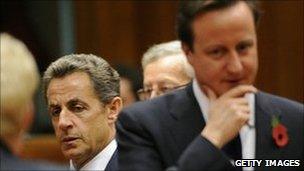The "South Atlantic question" in French-British plan
- Published

Has defence cooperation between London and Paris ever been closer?
Britain and France are being forced by budget cut-backs to co-operate more closely on defence.
They both want to be global players but increasingly lack the resources to remain so.
So a series of measures were formally agreed at a summit in London on Tuesday between Prime Minister David Cameron and President Nicolas Sarkozy.
And to judge from a phrase used by Mr Cameron this co-operation might in due course develop quite significantly. He said of one of the measures - the mutual use of each other's single aircraft carrier - that this might lead to an "integrated strike force."
The idea is for planes from both countries to be able to use both carriers and for one carrier always to be at sea. The British prime minister was saying that the concept is to go beyond training flights and emergency landings, as currently happens with French and American carrier aircraft.
Both he and President Sarkozy stressed said that full sovereignty would be maintained by each side, admitting that France was as "touchy" about this as Britain. That means the country owning the carrier in operation has a veto.
This would not matter if the operation was jointly agreed but one day there might be a crisis for one and not the other and that would indeed lead to a difficult situation.
President Sarkozy was asked the "South Atlantic question" at a news conference. What would happen if the British wanted the French carrier in the South Atlantic to defend the Falklands?
The president gave an evasive answer saying that France would never stand by "twiddling its thumbs" but of course that is exactly what it did in 1982 when the Falklands were invaded.
The official British reply is to say that the UK would still have its own carrier and that the sharing of the French carrier means more resources for the kinds of joint operations that are more much likely than another Falklands crisis in future.
The formation of a joint "expeditionary force" (the title implies an interventionist role) is another key element in all this. But sovereignty problems might not be so severe in this case because the force will not be integrated.
It will be formed for each operation from a pool of designated brigades. There will be a joint political decision to deploy but one overall commander chosen for the operation at the time.
A lot of the co-operation is on the technical side because that is where cash can be saved. One new idea is to pool resources on the testing of nuclear warheads by technical means.
Technology for this will be developed in Britain and testing will be done in France. The ability to test warheads this way is vital given the bans both governments observe on explosive testing. Each side will keep control of its own warhead technology, as they have to under arms control agreements.
'No EU army'
The British Defence Secretary Dr Liam Fox said: "This is not a push for an EU army which we oppose... It has always been my view that defence must be a sovereign and therefore an inter-governmental issue."
But are the seeds being sown here for the future?
Britain is not taking advantage of the mechanism offered by the Lisbon Treaty. The treaty allows for what is called "permanent structured cooperation in defence".
Such EU-led cooperation was envisaged in 1998 when Tony Blair and President Chirac agreed at St Malo that "The [European] Union must have the capacity for autonomous action, backed up by credible military forces".
That has not happened. The issue remains, though, as to whether in time this creeping co-operation might not lead to the "progressive framing of a common Union defence policy" agreed to in the Lisbon Treaty.
In the meantime Dr Fox declares that the new Franco-British defence relationship will be "the closest it has ever been".
This is debatable. It might be true in the sense of sharing facilities but hardly true in the sense of sharing commitments. Just think back to the First World War, when Marshal Foch ended up by commanding all French and British armies and a respectful Britain put up a statue of him outside Victoria Station.
And before that there was a secret military arrangement, simply called "conversations", which shows how what starts out as a theoretical contingency plan can develop into a major commitment.
The British cabinet as a whole was not told but the military staffs were given permission to develop plans under which Britain would come to France's help in the event of a German attack.
The talks were formalised in 1912 in an agreement to divide naval forces - if there was a war and if Britain joined in, Britain would take care of the Channel and France the Mediterranean.
Even though the British government kept on stressing that the plans did not commit it to a war in support of France, the practical and moral basis was being developed upon which Britain did commit itself to France and to a war with Germany.
Paul.Reynolds-INTERNET@bbc.co.uk
- Published29 October 2010
- Published19 October 2010
- Published19 October 2010
- Published31 October 2010